
|
Astronomy Picture Of the Day (APOD)
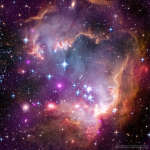 NGC 602 and Beyond
NGC 602 and Beyond
11.01.2020
Near the outskirts of the Small Magellanic Cloud, a satellite galaxy some 200 thousand light-years distant, lies 5 million year young star cluster NGC 602. Surrounded by natal gas and dust...
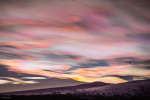 Nacreous Clouds over Sweden
Nacreous Clouds over Sweden
10.01.2020
Vivid and lustrous, wafting iridescent waves of color filled this mountain and skyscape near Tanndalen, Sweden on January 3. Known as nacreous clouds or mother-of-pearl clouds, they are rare. This northern winter season they have been making unforgettable appearances at high latitudes, though.
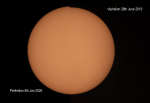 Perihelion to Aphelion
Perihelion to Aphelion
9.01.2020
Perihelion for 2020, the point in Earth's elliptical orbit when it is closest to the Sun, occurred on January 5th. The distance from the Sun doesn't determine the seasons, though. Those...
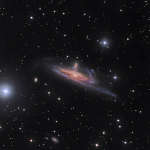 Galaxies in the River
Galaxies in the River
8.01.2020
Large galaxies grow by eating small ones. Even our own galaxy engages in a sort of galactic cannibalism, absorbing small galaxies that are too close and are captured by the Milky Way's gravity.
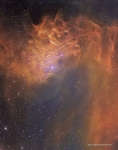 IC 405: The Flaming Star Nebula
IC 405: The Flaming Star Nebula
7.01.2020
Rippling dust and gas lanes give the Flaming Star Nebula its name. The orange and purple colors of the nebula are present in different regions and are created by different processes. The bright star...
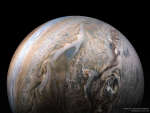 Tumultuous Clouds of Jupiter
Tumultuous Clouds of Jupiter
6.01.2020
Some cloud patterns on Jupiter are quite complex. The featured tumultuous clouds were captured in May by NASA's robotic Juno spacecraft currently orbiting our Solar System's largest planet. The image was taken...
 A Starry Night of Iceland
A Starry Night of Iceland
5.01.2020
On some nights, the sky is the best show in town. On this night, the sky was not only the best show in town, but a composite image of the sky won an international competition for landscape astrophotography. The featured winning image was taken in 2011 over JЖkulsАrlСn, the largest glacial lake in Iceland.
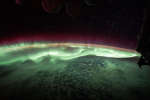 Aurora Slathers Up the Sky
Aurora Slathers Up the Sky
4.01.2020
Like salsa verde on your favorite burrito, a green aurora slathers up the sky in this 2017 June 25 snapshot from the International Space Station. About 400 kilometers (250 miles) above Earth, the orbiting station is itself within the upper realm of the auroral displays.
 Quadrantids over the Great Wall
Quadrantids over the Great Wall
3.01.2020
Named for a forgotten constellation, the Quadrantid Meteor Shower is an annual event for planet Earth's northern hemisphere skygazers The shower's radiant on the sky lies within the old, astronomically obsolete constellation Quadrans Muralis. That location is not far from the Big Dipper, at the boundaries of the modern constellations Bootes and Draco.
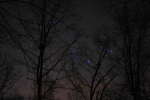 The Fainting of Betelgeuse
The Fainting of Betelgeuse
2.01.2020
Begirt with many a blazing star, Orion the Hunter is one of the most recognizable constellations. In this night skyscape the Hunter's stars rise in the northern hemisphere's winter sky on December 30, 2019, tangled in bare trees near Newnan, Georgia, USA.
|
January February March April May June July August September October November December |
|||||||||||||||||||||||||||||||||||||||||||||||||